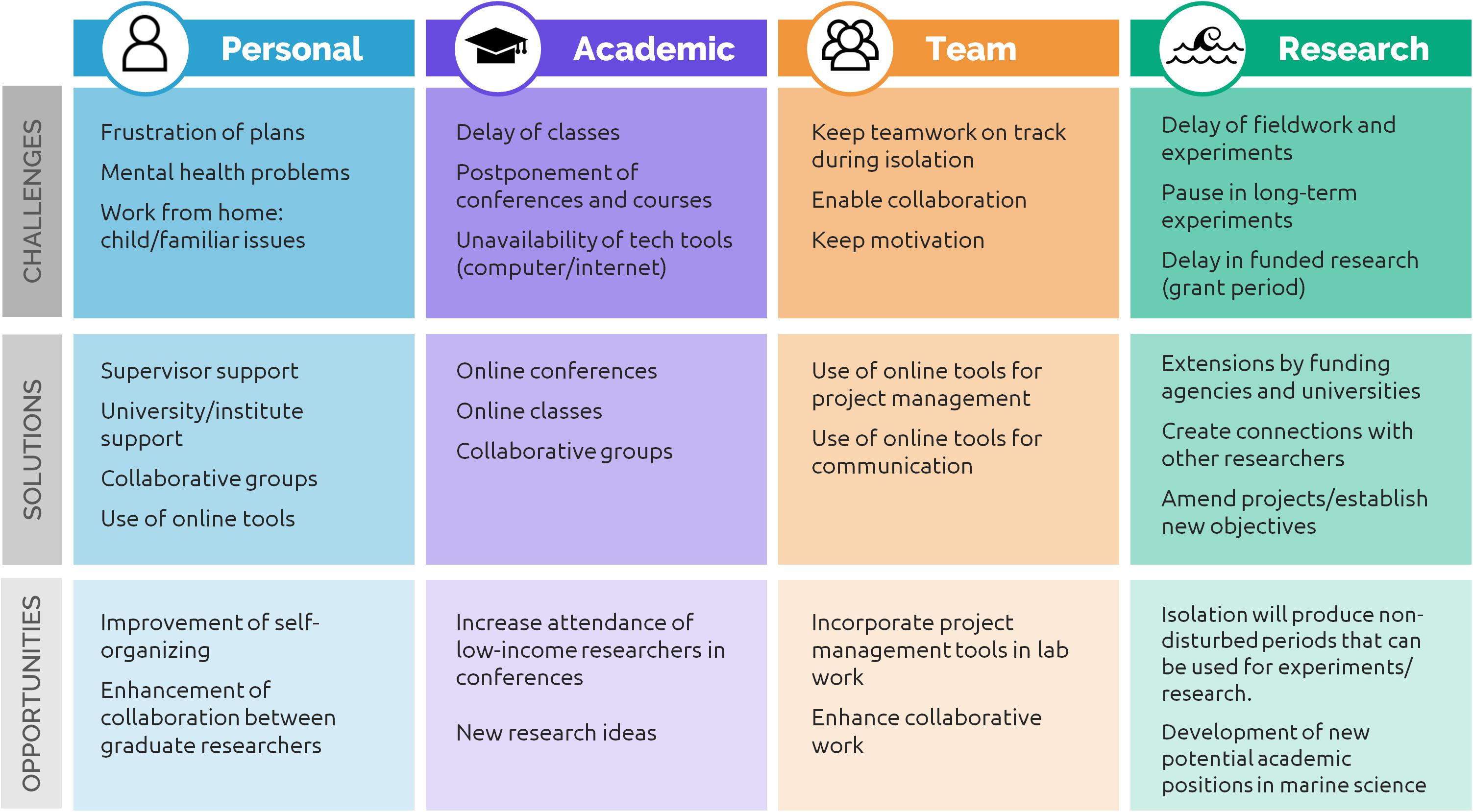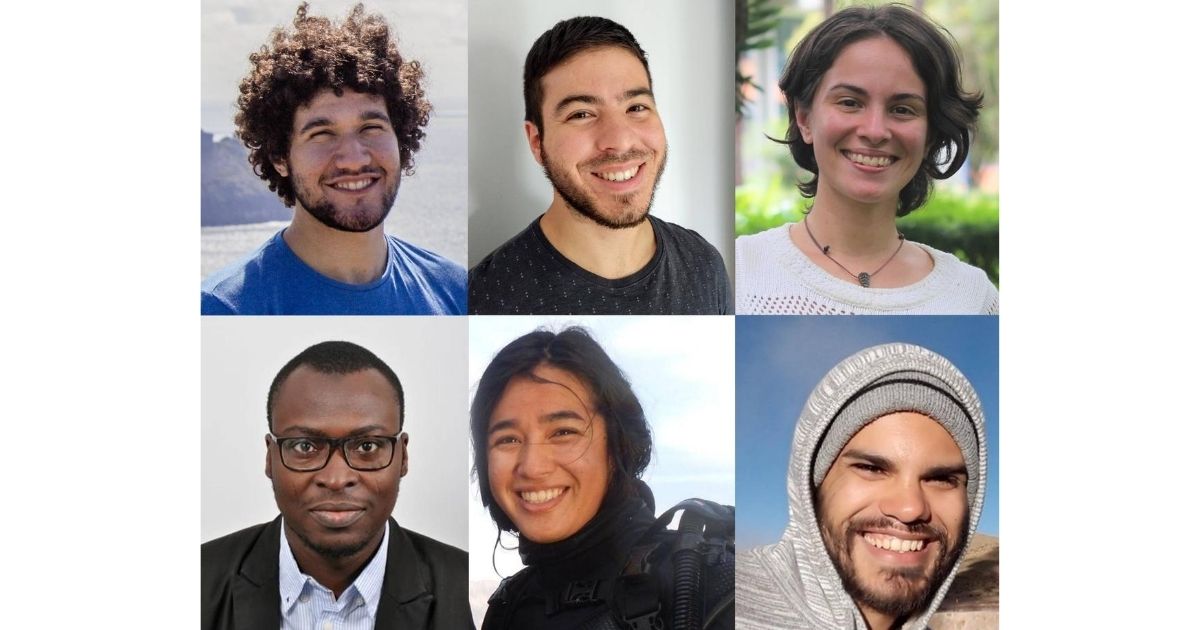A recently published perspective piece in Frontiers in Marine Science highlights the plight of marine research students amidst a COVID world.
Co-authors Silas C. Principe and Juan C. F. Pardo—both current Ph.D. candidates—conceived and designed the perspective piece, entitled ‘Advancing Through the Pandemic From the Perspective of Marine Graduate Researchers: Challenges, Solutions, and Opportunities.’ Overall the piece recounts the key COVID-induced struggles of marine Ph.D. students from around the world, with much of the expressed sentiments also applying more broadly to Masters candidates and to marine science student researchers in general.
While it isn’t difficult to understand that the pandemic has affected marine research students—there’s hardly an industry or individual left unscathed—understanding why the perspective was necessary to add to published literature points to inherent differences, and difficulties, within the marine sector.
 Challenges, solutions, and opportunities for graduate researchers in marine science
Challenges, solutions, and opportunities for graduate researchers in marine science
“The idea came about informally through conversation, while talking with each other about our struggles during the lockdown—emotional, personal, and just the work itself. We decided to bring it all into a format that would reach more people,” said Pardo, a Ph.D. research fellow at the Centre for Coastal Research (CCR), University of Agder (UiA) and Norwegian Institute for Water Research (NIVA).
Principe and Pardo decided to invite colleagues from around the world—all Ph.D. students at different stages—to participate in writing the perspective. They were joined by four equally-contributing Ph.D. candidates who co-authored the paper published in June 2020: Debra Ramon, Morris Kahn Marine Research Station, University of Haifa, Israel; Gabriel Stefanelli-Silva, Laboratório de Ecologia e Evolução de Mar Profundo (LAMP), University of São Paulo, Brazil; Isa Elegbede, Brandenburg University of Technology Cottbus-Senftenberg (BTU), Germany; and Luciana S. Lima, Instituto Nacional de Pesquisas Espaciais (INPE), São José dos Campos, Brazil.
The ongoing COVID-19 pandemic has brought about a new social and academic reality to researchers worldwide, note the authors. But why does the pandemic—and associated lockdowns and delays—cause more of an issue for marine science graduates than to graduate students in other industries? Other industries’ work-from-home capabilities lack dependence on the natural world for completion of a day’s work, but for marine researchers, it’s quite a different story.
“Some things are just very specific to this field. Logistics, for example—using a ship for research. You have to think about tide, the right weather, the right everything to do the research. It’s quite hard. So many things cost a lot, like a ship or equipment. These issues are specific to the marine sciences,” explains Pardo.
Coral surveys can’t be conducted in a living room. Water quality testing can’t happen virtually. And most graduate students hardly have the budget for a decked-out home aquarium, let only a fully functioning wet lab with high-tech filtration systems and all the additional project-specific bells and whistles. Unless a researcher is in a fully analytic stage of the Ph.D. process, COVID will likely upend the research schedule. Understanding exactly how COVID has and continues to disrupt the PhD or research process could help ensure adequate planning for both the near and far future.And for marine researchers specifically, there are several anticipated short- and long-term impacts of COVID to consider.
“For the short-term: The lockdown of our universities; everyone has to stop working in the field and in the labs—just so much closing and interruptions. And having to struggle with the balance of family and work life,” explains Principe, Ph.D. candidate at the Laboratório de Biologia Recifal (BIOREC), University of São Paulo. “For the long-term: Productivity likely shortened; funding cuts; not all countries and agencies, etc. are extending funding. Financing problems are even already occurring. And then there’s the worry that some of the short-term impacts ultimately become long-term.”
Pardo added, “And for job positions which are already competitive, it will be more difficult. With this economic fallout, the money will go another direction, so we think both the science industry job postings and the money for science research will be reduced. And of course, there’s the question—will there be another COVID wave?”
At the same time, the pandemic demands revised strategies to deal with the ongoing difficulties and tackle similar future situations, write the authors. Rather than simply recount COVID-associated difficulties, the perspective drives an optimistic outlook, suggesting solutions aimed at innovation, active communication, persistence, and continual advancement. Some of the key suggested solutions include the following: re-scheduling research projects and grants (if and whenever possible through funding agencies and universities); supporting online conferences and working group meetings; using existing technologies to foster collaboration; continuing academic development through online courses; and creating online groups for optimized sharing.
Based on this last idea, the most critical solution-driven output from the perspective is a shared social media presence via Twitter account—Marine Graduate Opportunities—@mar_opps. Using the hashtag ‘#marineopps’ will repost relevant information onto the Twitter page, thus facilitating an efficient and informative platform for communication.
Principe recalls, “We thought, ‘Wow. Now the [marine research] opportunities are going to be even more difficult to get because there will be less money, and it will be more competitive. And there’s just so many different places and sites where things are posted. We thought maybe we could put everything together in one place.”
“Ultimately, it was the right moment to bring [the Twitter account] out—just a great opportunity to create it. It will be a general repository for all of the different opportunities—not only jobs but conferences and courses around the world,” added Pardo.
The Twitter account allows for active engagement and communication amongst marine graduate students and researchers. With the ability to share updates in one key location, the goal is to progress through the pandemic as seamlessly as possible while allowing for legitimate advancements beyond.
“During this time everyone is suffering, but if we try to work together maybe we can strive in this hard situation,” said Principe. “Maybe the main message of our article is just this: let’s work together, put our efforts together as Ph.D. students and make more collaborations.”
#inspired
#progress
#marineopps
By Megan Fraser, ECO Contributor





